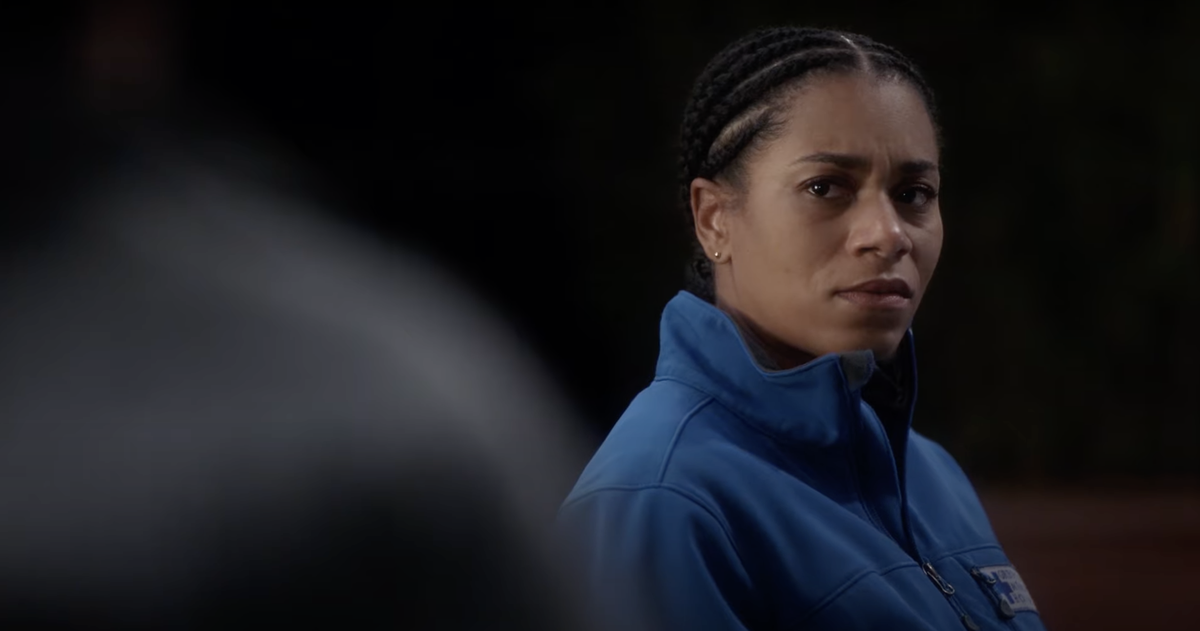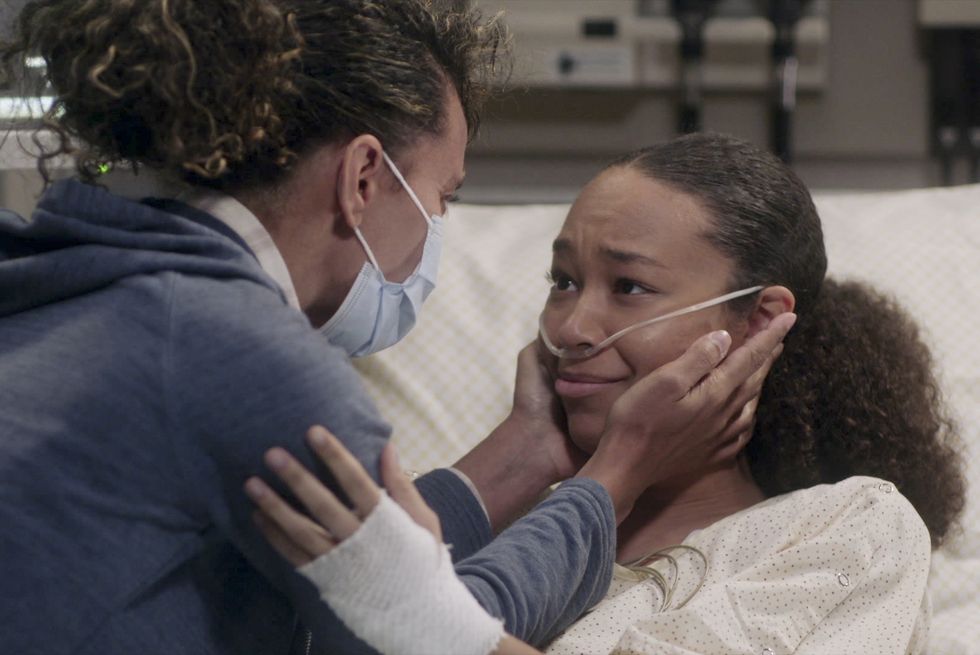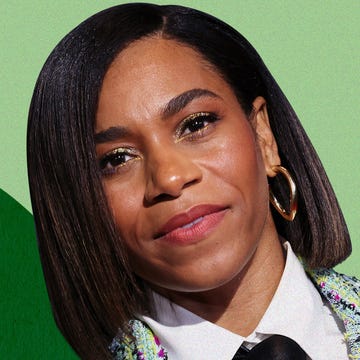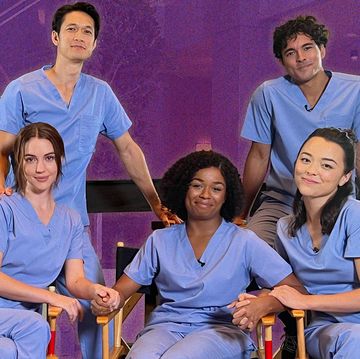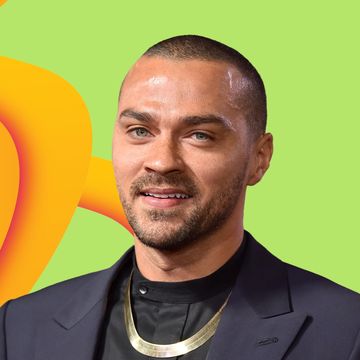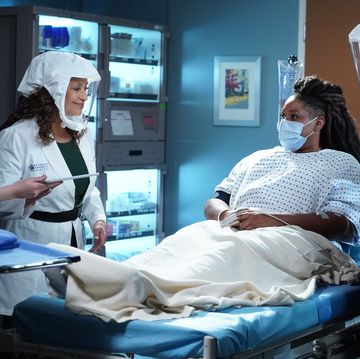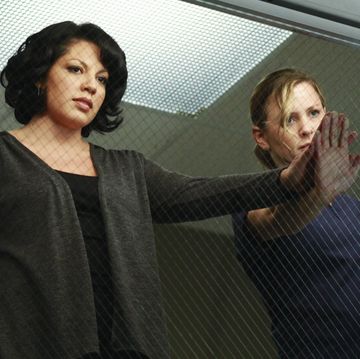On the December 17 episode of Grey’s Anatomy — which was also part of a crossover episode with Station 19, which airs just before Grey’s — two young Black girls are kidnapped by a human trafficker and trapped in his house.
Airing just weeks before the start of National Slavery and Human Trafficking month, Grey’s and S19 showrunner Krista Vernoff hoped to further the conversation surrounding Black girls and women and their vulnerability, regarding human trafficking and other forms of sexual violence and exploitation. In 2011, the U.S. Department of Justice reported that 40 percent of human trafficking victims, including both children and adults, were Black. Black children also make up 52 percent of all juvenile “prostitution” arrests.
Black Girl Freedom Fund, an organization that supports Black girls and families and is an initiative of Grantmakers for Girls of Color (G4GC), told Shondaland that Grey’s and Station 19’s portrayal of this issue is what’s needed in media.
“Black girls and women are disproportionately impacted by human trafficking, but are rarely part of the cultural conversation about it. Telling the stories of Black girls and women who are survivors of trafficking provides an opportunity to develop appropriate responses to their experiences with this trauma. It combats erasure and can hopefully facilitate healing — and policy responses to exploitation that do not criminalize survivors.”
In the Grey’s episode, the two girls and the human trafficker who stole them are brought to Grey Sloan Memorial for smoke inhalation and burns sustained in a fire they started to try to force unresponsive and uncaring police officers to allow the Station 19 crew to save them.
For Maggie Pierce, Grey Sloan Memorial’s superstar cardiac surgeon and a Black woman, treating these girls resurfaces her own frustrations. And for Maggie, the racism and sexism is all intimately related to the Covid-19 pandemic she’s trying desperately to address, while most of her dying patients are Black and Latino.
Kelly McCreary, the actor who plays Maggie Pierce, tells Shondaland that performing the scene where Maggie tells Amelia of her frustrations about the issues facing Black women and sexual violence, as well as the racist response to the pandemic, was “cathartic, in some ways. But in other ways it was also so incredibly sad that this is our reality, and it’s so frustrating that our reality is a new idea for so many people.”
For McCreary, this episode highlights the importance of going beyond diversity in casting and hiring, but allowing those characters’ “perspectives to infuse what’s happening.” McCreary felt especially grateful to work on this episode with her husband, Pete Chatmon, who directed the Grey’s Anatomy episode, and Felicia Pride, who wrote it.
“It was so wonderful to work with him, not just because I think he's incredibly talented and I like spending extra time with my husband," says McCreary. "But because having this story in the hands of people like Felicia and Pete who either live as Black women, or are Black men who have closely observed the lives of Black women — that matters so much.”
In writing the episode, Pride felt grateful to be able to bring these issues to Greys’ and spread awareness to the show's millions of viewers. “We were able to not just show how horrifying sex trafficking is, but to really point out the main reason Black girls and women are vulnerable to it in the first place.”
Examining this issue through Maggie, Pride says, was important because even though Maggie is an accomplished doctor who saves lives all day, she likely lives with these feelings of societal devaluation, feelings that this traumatic event is bringing to the surface.
One of the most angering scenes in the story’s depiction comes from the episode of Station 19, in which a white male police officer callously asks the young girls invasive and graphic questions mere minutes after they were rescued from the fire. This is part of something called “adultification,” which Black Girl Freedom Fund identifies as a “dehumanizing age compression which leads people to read Black girls as more adult-like and therefore less worthy of protection, comfort, and nurturing.”
A 2017 Georgetown Center on Poverty and Inequality study found that Black girls experience this start as young as five years old and it typically peaks when they're between the ages of 10-14.
“When we apply a gender lens to anti-Blackness, we understand that young Black women and girls are subjected to tropes and stereotypes that present them as hypersexual, conniving, and unlawful. This can obscure other people's perceptions of their traumas and, consequently, the responses associated with them. It leads to harsher punishment, disregard for their pain, and a general apathy about the development of interventions that can shift their life outcomes,” Black Girl Freedom Fund states.
And Maggie’s not the only Black woman character for whom this crime forces an examination of her own feelings and vulnerabilities imposed by racist societies and systems.
Vic, a Station 19 firefighter played by Barrett Doss, and her crew bring the girls to Grey Sloan Memorial after rescuing them — but the rescue is filled with chaos and injustice.
In the scene, the mothers of the kidnapped girls frantically try to save their daughters. But the police, who arrive at the request of the human trafficker who denies the kidnapping allegations and has accused the mothers of harassing him, refuse to listen to the mothers and to search the house for the girls. This leads Vic and the Station 19 crew to spring into action after the girls set a fire in the cellar they’re trapped in, hoping the flames and fumes will force the police and firefighters to come in and save them. Still, the police persist in trying to prevent the firefighters from entering the house, although they eventually do, saving the girls.
When the police are confronted about the harmful actions by both the girls’ mothers and the crew, they forcefully arrest one of the mothers and Dean, a Black firefighter played by Okieriete “Oak” Onaodowan. It’s an incredibly traumatic and brutal scene.
Doss says that when she and her castmates read the painful script, they all had strong reactions to it. They realized the need to raise awareness about human trafficking, sexual violence against Black girls and women, and police brutality, but “as actors, we ask ourselves to step into the shoes of these people, and it’s possible that some of these things might have happened to any number of my castmates, or to me.”
That’s why, Doss says, it was so important to show how these girls were exploited and criminalized and unheard in ways that challenge the audience to ask questions about why these injustices exist. “This episode shines a light on Black women and girls who go missing all the time and sometimes people don't look for them.”
McCreary hopes that seeing this episode will inspire viewers to take action. “You can't fix what you can't see. Right?” she says. “I hope this episode enables people to see from the perspective of people who are living the experience from the perspective of Black women and girls.”
Black Girl Freedom Fund adds: “Media should be careful not to suggest that Black girls are ‘choosing’ exploitation or predisposed to sexual violence. Over-representation is not the same as predisposition.”
Pride set out to write an episode that both showed the reality of Black girls and women who are victims of human trafficking, but to show ways to prevent it by attacking the systemic oppression, or as Maggie puts it in her speech, “The monsters that got us here.”
“I really do hope that we can walk away with seeing Black girls for who they are, girls just like any of their peers who deserve to be protected,” Pride says.
Nylah Burton is a Washington D.C. based writer. Follow her on Twitter @yumcoconutmilk.
Get Shondaland directly in your inbox: SUBSCRIBE TODAY
